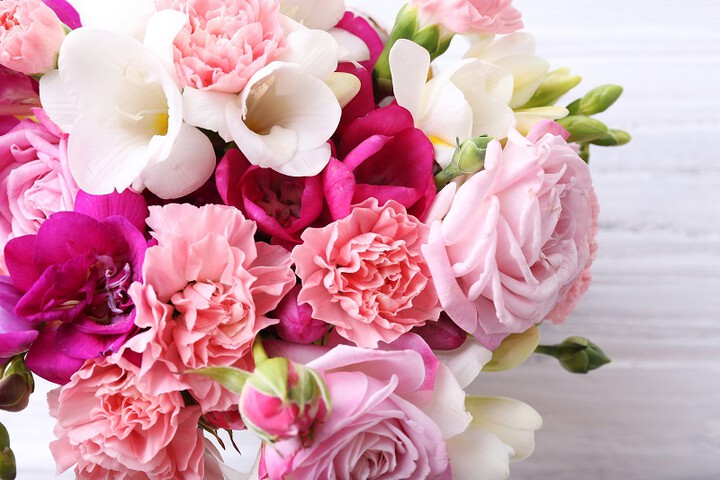
Flowers are a go-to gift for any occasion; be it a birthday, an anniversary, an engagement or a simple gesture to say ‘I love you’. Bright, bold freshly cut blooms bring cheer to any room in the household, as well as a sweet scent, which is why it’s important to do all that you can to make them last as long as possible! One way to do this is to avoid placing them next to ripening fruit.
Read on to learn more about ensuring the longevity of freshly cut flowers and the impact that placing them near fruit can have…
Avoid direct sunlight, fruit, heat, and drafts
Placing cut flowers in a room with cool temperatures will ensure they last longer. Displaying them in direct sunlight or near appliances that generate heat will decrease their lifespan, as all of these elements can cause blooms to dehydrate rapidly. One thing many don’t know is that you should also avoid displaying your bouquet near fruit. Ripening fruits release small amounts of ethylene gas, which can cause your beautiful bold and colorful fresh flower arrangement to dwindle in an instant, leaving you with sorry looking blooms, browning stems, and wilting leaves.
Which fruits to avoid
Placing your blooms near common fruits, many of which can be found in the average kitchen fruit bowl should be avoided whenever possible. These include tomatoes, bananas, kiwis and apples. These particular fruits, although tasty, are very harmful to freshly cut blooms as they produce high levels of the gas ethylene. This gas stimulates the ethylene production in plants and can cause leaves and blooms to age rapidly – the last thing you want when you have only just invested in a beautiful bouquet. The flowers and leaves will often wilt, turn brown and die. Certain ethylene sensitive plants will even showcase bud, flower and leaf drop – all of these ailments will have a detrimental effect on your cut flowers and their lifespan.
Never put flowers near ripening fruit
Asides from placing flowers near fresh fruit, you should also avoid placing them near ripening fruit – like fruit that is browning or about to go off tends to release even higher amounts of ethylene. Even in small doses, this gas has the ability to prematurely age freshly cut flowers, leaving you less time to enjoy their beauty and fragrance.
Remove dying flowers from the vase immediately
The ethylene gas emitted from ripening fruit may only affect certain flowers in the vase. If you spot dying flowers, remove them immediately as this could mean you can save the other blooms. Should the opportunity present itself, move your vase or basket to a different room in the house, as that may also help to prolong the life of your flowers.
Why does ripening fruit rot nearby plants and fruits?
To protect themselves from drying out, plants and shrubs will often drop their buds, flowers, and leaves. When considering freshly cut flowers and potted plants, this dropping is usually the result of the over-production of the growth hormone ethylene. This chemical is the only known gas that comes in the shape of a naturally occurring plant growth hormone. Ethylene gas speeds up the ripening and aging of cut flowers, potted plants, fruits, and vegetables. In fact, it is often purposely used to promote the ripening of fruits. Too much of this chemical can have harmful effects.
How to avoid this from happening
It’s easy to forget this rule, as the kitchen is one of the most common places to display freshly cut flowers. To avoid them rotting or becoming the victim of over ripened fruit, think about displaying them in another room in the household. Freshly cut flowers add an injection of color and fragrance to any area in both the home and office, including the likes of the study, the bedroom, the living room, and the hallway. If you must display them in the kitchen, place them in a position that is a good distance away from the fruit bowl! Or better still, get rid of any old fruit as soon as it starts to show signs of over-ripening.
Act quickly
If you notice that freshly cut blooms are looking a little worse for wear, try to resurrect them as quickly as possible! This involves removing any dead or lackluster blooms and any brown, drooping leaves from the vessel as soon as you spot them. Use a knife or a pair of kitchen scissors to deadhead your blooms, as a clean cut can also help to preserve your flowers.
You can also preserve your blooms by spraying them with hairspray, by hardening the stems in warm water and by keeping the stems freshly cut. Using a clean vase and keeping your plants well-fed will also prolong their lifespan.